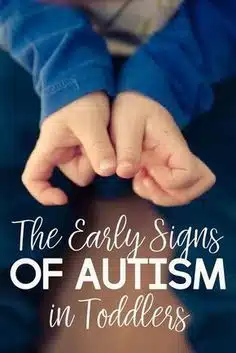We know you’re always keeping an eye on your toddler’s development, and sometimes, you might wonder about the signs of autism. Don’t worry; we’ve got you covered. Here’s a list of 5 key signs of autism in toddlers to help you spot them early and ensure your neurodivergent kiddo gets the support they need.
Table of Contents
1. Speech Development: A Bit Behind Schedule?
One of the most telling signs of autism in toddlers is a delay in speech development. Now, we know each child is unique, but if your little one isn’t meeting typical speech milestones, it could point to autism. Look for these signs:
- Babbling is still absent at 12 months
- No single words by 16 months
- Two-word phrases are missing at 24 months
- Loss of previously acquired speech
Remember, it’s essential to keep an open dialogue with your pediatrician about your child’s progress.
Goally | Visual Scheduler for Autism
Does your child struggle with getting ready in the morning independently? Goally’s routine app on the best tablet for kids breaks down large tasks into small, achievable steps for autistic kids. Create custom routines with your own videos & pictures for every step.
2. Social Interaction: Struggling to Connect
Another sign of autism in toddlers is difficulty with social interaction. Neurodivergent kids may have a hard time understanding social cues and connecting with others. Here’s what you should watch out for:
- Not responding to their name by 12 months
- Avoiding eye contact
- Struggling to understand emotions
- Not engaging in pretend play by 18 months
Don’t hesitate to reach out to a professional if you notice these behaviors in your child.

Read more: 5 Signs of Autism
3. Repetitive Behaviors and Restricted Interests: A Unique Pattern
Kids with thinking and learning differences, like autism, often exhibit repetitive behaviors and have restricted interests. These unique patterns can show up in different ways, such as:
- Repeating actions like hand flapping or rocking
- Insisting on strict routines
- Fixating on specific topics or objects
- Repetitive play, like lining up toys
It’s crucial to be patient and understanding with your child as they navigate their world.
4. Sensory Sensitivities: A World of Extreme Sensations
Many neurodivergent kids experience heightened or reduced sensitivity to sensory stimuli. This can lead to seeking out or avoiding specific sensory experiences. Check out these common sensory sensitivities in toddlers:
- Overreacting to loud noises or bright lights
- Extreme sensitivity to textures in clothing or food
- Seeking out specific sensory inputs, like rubbing objects or deep pressure
- Disliking being touched or cuddled
Being aware of these sensitivities can help you create a more comfortable environment for your child.

Read more: Autism Touch Sensitivity in Kids
5. Child Runs Away When Upset: A Sign of Emotional Overwhelm
It’s normal for a child to run away when they’re upset, but if your toddler does this frequently, it could be a sign of autism. Kids with autism may have difficulty expressing their feelings and regulating their emotions. As a result, they might run away when they’re overwhelmed. Keep an eye on this behavior and seek professional advice if you’re concerned.
| Sign | What to Look For |
|---|---|
| Delayed Speech | Missing speech milestones, loss of acquired speech |
| Social Interaction Difficulties | Not responding to name, avoiding eye contact, struggling to understand emotions |
| Repetitive Behaviors | Repeating actions, strict routines, fixating on topics |
| Sensory Sensitivities | Overreacting to stimuli, sensitivity to textures, seeking sensory inputs |
| Running Away When Upset | Frequent running away due to emotional overwhelm |
Wrapping Up
Keep in mind that every child is unique, and the presence of one or more of these signs doesn’t necessarily mean your child has autism. However, if you notice a pattern and have concerns, trust your instincts and consult with a professional. Early intervention is crucial for kids with thinking and learning differences, and recognizing the signs of autism in your toddler can be the first step towards getting the support they need. You know your child best, and you’re their strongest advocate! Check out Autism in a 2 Year Old Quiz | 10 Questions.
This post was originally published on 05/07/2023. It was updated on 08/10/2023.

Goally
We help parents teach their kids life skills, like doing bedtime and morning independently. Backed by science, we incorporate evidence-based practices and expert-informed designs in all of our apps and content.








